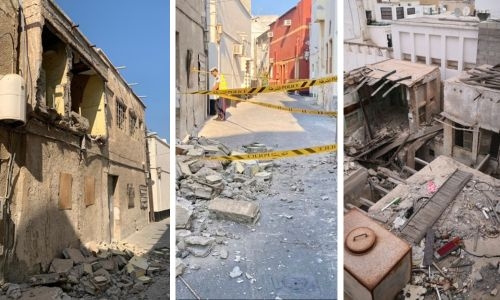Over 400 houses across Muharraq falling apart, leaving residents fearful for safety
TDT | Manama
The Daily Tribune - www.newsofbahrain.com
Email: ashen@newsofbahrain.com
Another derelict house in Muharraq collapsed earlier this week, just missing pedestrians and raising concerns about the condition of other crumbling homes in the area. The sight of bricks and debris strewn across the alleyways exposed a dangerous problem: hundreds of homes in the historic city are falling apart, posing a serious threat to residents and the city’s heritage. While immediate dangers are being addressed, long-term solutions remain elusive, leaving residents fearful and frustrated. For residents like Aysha, who lives near the site of the recent collapse in Block 203, the fear is palpable.
“The situation is quite alarming,” she says, gesturing towards the sagging roofs and peeling paint of nearby homes. “We wonder when one of these houses will finally cause a disaster. The authorities need to take action before someone gets hurt.” Her concerns are not unfounded. In April, the kitchen roof of a house in the same district caved in during heavy rains, nearly injuring an elderly resident and her domestic worker.
This resident, whose renovation request has been pending since 2000, exemplifies the plight faced by many: unable to afford the exorbitant costs of repair, they live in constant fear. She even resorts to sleeping with a rat trap by her head due to the rodent infestation common in these decaying structures.
Financial burdens
Local councillor Dalal Al Moqahwi has been a vocal advocate for these residents, emphasising the financial burdens they face.
She estimates that over 400 homes across Muharraq are in various stages of disrepair, based on reports to the Municipal Council and ongoing assessments by a newly formed subcommittee involving multiple authorities.
This subcommittee is tasked with assessing the risk level of each property, managing immediate threats, and developing a comprehensive inventory of at-risk buildings.
Al Moqahwi explains that the requirement from the Bahrain Authority for Culture and Antiquities (BACA) for owners to bear the costs of demolition and rehabilitation, often exceeding BD20,000, makes it nearly impossible for many to restore their homes, particularly those with heritage features. “These families would have fixed their homes if they had the means,” she told The Daily Tribune.
The dangers extend beyond the immediate risk of collapse. Abandoned properties have become magnets for crime, attracting drug activity and theft, according to both residents and council members like Abdulqader Mahmood.
He notes frequent complaints about strange noises coming from these abandoned houses. “Even after I report the most dangerous ones,” he explained to The Daily Tribune, “the authorities often just seal the entrances with a sheet of wood, which criminals easily break through.”
The decaying structures also contribute to the spread of disease, with infestations of rats and insects posing a public health risk.
Web page
In response to worsening conditions, the Ministry of Housing and Urban Planning launched a web page for the Muharraq City Development Plan last November.
This initiative, following directives from His Majesty King Hamad bin Isa Al Khalifa and His Royal Highness Prince Salman bin Hamad Al Khalifa, the Crown Prince and Prime Minister, seeks to breathe new life into Muharraq while conserving its rich history.
Housing Minister, His Excellency Amna Al Rumaihi, has confirmed that the Old Muharraq Development Project is now underway, with all phases expected to be finished by December 2026.
While Al Moqahwi acknowledges the Ministry’s progress in areas such as Block 203 and Block 209, she notes the resistance from some families who are reluctant to move. These homes, often their only place of residence, present a difficult choice.
Al Moqahwi stresses the need for a balanced approach, one that prioritises residents’ safety without sacrificing the longterm future of the community’s housing needs.
Budget
Municipal Council member Fadhel Al Oud points to the lack of a dedicated budget for the council’s work, hindering their ability to address the crisis effectively.
“Our success primarily depends on coordinating with relevant authorities and relying on charitable organisations to help cover renovation costs,” he told The Daily Tribune.
The council submitted a recommendation to parliament for budget allocation in the first session of the current convening period, but the outcome is still pending.
Al Oud emphasises the urgent need for a dedicated portion of the state budget to address homes at risk of collapse, particularly given the royal endorsement of the matter.
DALAL AL MOQAHWI, MUNICIPAL COUNCIL MEMBER
ABDULQADER MAHMOOD, MUNICIPAL COUNCIL MEMBER
FADHEL AL OUD, MUNICIPAL COUNCIL MEMBER
Related Posts

